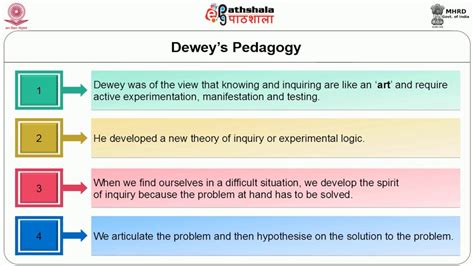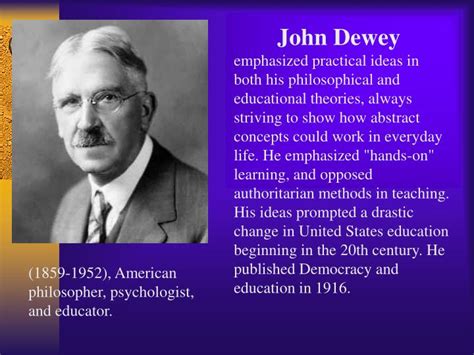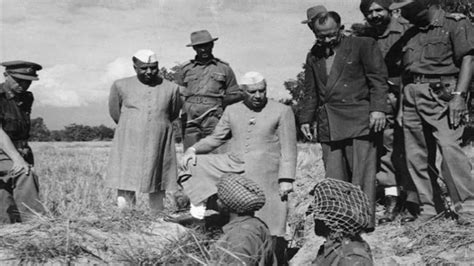John Dewey Theory

In the realm of educational philosophy, few names resonate as profoundly as John Dewey, a visionary thinker who shaped the very foundations of modern education. Dewey's ideas have not only stood the test of time but continue to influence educational practices worldwide. This article delves into the core principles of John Dewey's Theory, exploring its historical context, key tenets, and enduring impact on pedagogy.
The Evolution of John Dewey’s Educational Philosophy

John Dewey, an American philosopher, psychologist, and educational reformer, is renowned for his contributions to progressivism in education. His theories, developed over a prolific career spanning the late 19th and early 20th centuries, represent a pivotal shift in educational thought. Dewey’s philosophy was not merely an academic exercise; it was a response to the societal changes and challenges of his era, advocating for a more democratic, experiential approach to learning.
Born in 1859, Dewey's early life and educational experiences laid the groundwork for his innovative ideas. His exposure to diverse educational settings, from small rural schools to the prestigious University of Vermont, provided him with a unique perspective on the state of education. Dewey's own academic journey, which included a Ph.D. from Johns Hopkins University, equipped him with the intellectual tools to challenge traditional educational paradigms.
The Core Tenets of John Dewey’s Theory

At the heart of Dewey’s educational philosophy is the concept of learning through experience. He argued that true education occurs when learners engage actively with their environment, constructing knowledge through hands-on experiences and reflection. This idea contradicted the prevalent didactic methods of his time, which often emphasized rote learning and teacher-centric instruction.
The Experiential Learning Cycle
Dewey’s experiential learning model can be broken down into a cyclical process: problem, inquiry, exploration, and application. Learners first encounter a problem or challenge, which sparks curiosity and motivates them to seek solutions. This inquiry phase leads to exploration, where learners gather information and experiment with ideas. Finally, the application stage involves putting newfound knowledge into practice, completing the learning cycle.
| Learning Phase | Description |
|---|---|
| Problem | Identifying a challenge or question. |
| Inquiry | Seeking answers and understanding. |
| Exploration | Experimenting and gathering knowledge. |
| Application | Putting learning into practice. |

This cyclical approach emphasizes the continuous nature of learning, where each experience builds upon the last, fostering a deeper understanding of the world.
The Role of the Educator
In Dewey’s theory, the educator’s role is transformative. Teachers are not mere knowledge dispensers but guides who facilitate learning by creating environments conducive to exploration and discovery. They encourage critical thinking, provide resources, and offer guidance, allowing learners to take ownership of their educational journey.
The Importance of Social Learning
Dewey recognized the intrinsic social nature of learning. He believed that education should foster collaboration and community, as these elements enhance the learning process. Learning in a social context, whether through group projects or classroom discussions, promotes the exchange of ideas, empathy, and a deeper understanding of diverse perspectives.
Implementing Dewey’s Theory in Practice
Translating Dewey’s philosophy into practical classroom strategies involves a paradigm shift. Educators must embrace a student-centric approach, designing lessons that encourage active engagement and critical thinking. Project-based learning, where students work collaboratively on real-world problems, is a prime example of Dewey’s principles in action.
Challenges and Adaptations
While Dewey’s ideas have had a profound impact, implementing them can be challenging. Educators often face constraints such as standardized testing, curriculum requirements, and time limitations. However, many have successfully integrated Dewey’s principles by adapting them to their specific contexts. For instance, incorporating experiential elements into existing lesson plans or creating dedicated project days can provide students with valuable opportunities for hands-on learning.
The Legacy of John Dewey’s Theory
John Dewey’s educational philosophy has left an indelible mark on pedagogy. His ideas have inspired countless educators and continue to shape educational practices worldwide. Dewey’s emphasis on experiential learning, social interaction, and democratic values has paved the way for progressive educational reforms, influencing curriculum design, teaching methodologies, and the very culture of learning.
Moreover, Dewey's legacy extends beyond the classroom. His philosophy has informed the development of democratic societies, fostering an understanding of the importance of active citizenship and critical engagement with the world. Dewey's ideas continue to challenge us to think deeply about the purpose of education and the role it plays in shaping our society.
Conclusion

John Dewey’s Theory is a testament to the power of educational philosophy to shape practice. His ideas, rooted in experience and social interaction, offer a transformative vision for education. By embracing Dewey’s principles, educators can create dynamic learning environments that empower students to become active, engaged citizens, prepared to navigate an ever-changing world.
Frequently Asked Questions
How does Dewey’s theory compare to other educational philosophies?
+Dewey’s theory is distinct from traditional philosophies like essentialism and perennialism, which emphasize the transmission of fixed knowledge. Dewey’s focus on experience and social learning aligns more closely with constructivist theories, advocating for a learner-centric approach.
What are some real-world examples of Dewey’s principles in practice?
+Project-based learning initiatives, where students tackle complex problems and create solutions, are a modern-day embodiment of Dewey’s experiential learning cycle. Cooperative learning strategies, which promote social interaction and collaboration, also reflect Dewey’s emphasis on social learning.
How can educators incorporate Dewey’s ideas into their classrooms despite curriculum constraints?
+Incorporating Dewey’s principles can be done incrementally. Educators can start by identifying specific lessons or units where experiential learning can be integrated. This might involve designing project-based activities or encouraging collaborative problem-solving. Even small adaptations can have a significant impact on student engagement and learning.



